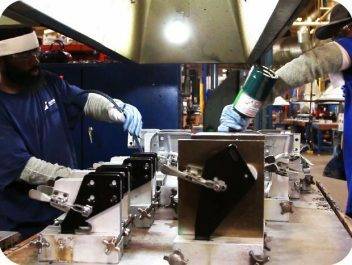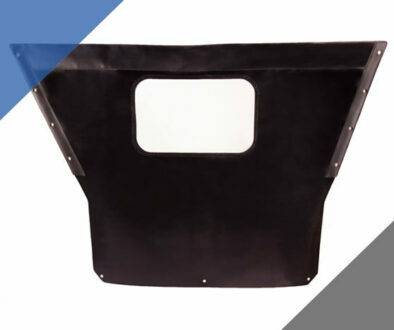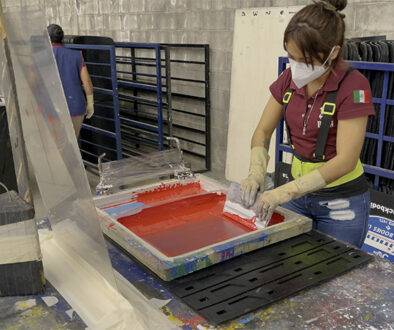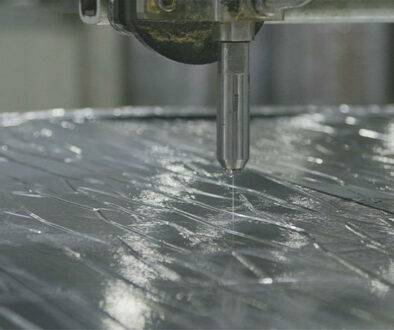An Inside Look into All-State Industries – A Non-Metallic Fabricator

Bob Pulver founded All-State Industries in 1974 as a conveyor belt distributor. Pulver decided to go out on his own after being employed right out of college by a major industrial rubber products division of one of the largest tire manufacturers in the world.
Eventually, conveyor belt distribution led to both distribution and fabrication. Any belt that was sized to fit the application needs of All-State’s customers typically produced a healthy amount of remnant material.
“During the late 80s, members of the All-State team were going to a lot of agricultural and construction equipment shows to check for non-metallic component opportunities” explains Reed Pulver, VP of Sales and Marketing. “It was at these events we started to see how much of that conveyor belt material and/or some level of recycled rubber product was being die-cut to produce certain parts on primarily agriculture and construction equipment.”
In no time, All-State started to take the remnant materials from its conveyor belt fabrication processes and cut them into parts used on agricultural, construction, and marine equipment and various trucks, recreational, and utility vehicles.
Claim to Fame in Die-Cutting
“We produced a lot of parts that were meant to be protective in nature. Some parts were curtains, baffles or recirculation shields meant to direct the flow of something and/or block air or debris from entering certain areas of the equipment,” explains Reed. “However, our claim to fame in the die-cutting arena came in 1988 when we quoted and were awarded an incredibly high-volume PVC conveyor belt part used on a type of popular exercise equipment at the time.”
Reed went on to explain how they quickly discovered that the amount of remnant materials left over from their conveyor belt fabrication process was insufficient to keep up with large OEM volumes.
All-State started purchasing full rolls of various raw materials, including PVC, urethane, and recycled materials like masticated rubber from raw material producers all over the country. This would soon open the door to dealing with raw material suppliers all over the world.
Masticated rubber is a compound made from reclaimed/recycled rubber left over from the production of (typically) tires of all kinds. “In our case, we recycle pre-consumer tire friction waste sourced from various tire manufacturers around the world.”
According to Reed, it is one of the most cost-effective materials for many die-cut applications.
Custom-Engineered Non-Metallic Components
In addition to die-cut recycled masticated rubber products, All-State offers a variety of non-metallic component capabilities for parts made from:
- Virgin Rubber Compounds – EPDM, SBR, Neoprene, Nitrile, Silicone, FKM, and Natural Rubber.
- Polyurethane (Cast urethane) Compounds.
- Engineered Plastic Materials – UHMW, HDPE, PP, Nylons, ABS, Polycarbonate, Acetal, and many more.
- Open-Cell Polyurethane Foams, Closed-Cell Polyethylene Foam, and Polyester Fiber Insulation components produced either on die-cut roller presses or using a handful of water jets (without or without facings and/or pressure-sensitive adhesives for installation).
“We’re fabricating plastic parts from sheet, rod, and tube, and turning it into gears, sheaves, wear pads, bumpers, bushings, manifolds, stabilizer pads, and more,” says Reed.
Acquisition of Allied Plastics
Recently, All-State acquired Allied Plastics, LLC, a thermoformer in Twin Lakes, Wisconsin. Allied specializes in medium-to-heavy-gauge thermoformed plastic components.
“We are excited about the opportunity this partnership presents. It propels the All-State platform to have an unmatched scale and capabilities that allow us to better service our existing customer base and pursue growth in new, untapped markets,” says Scott Pulver, CEO of All-State.
Providing thermoforming solutions through the Allied acquisition allows All-State to be a full-service non-metallic fabricator for some of the world’s most demanding industrial applications across a range of industries, including:
- Agricultural
- Mining
- Construction
- Class 7-8 Truck
- Recreational Vehicles
- Marine
- Utility Vehicles
- Power Generation Applications
- Military equipment
- + many more



